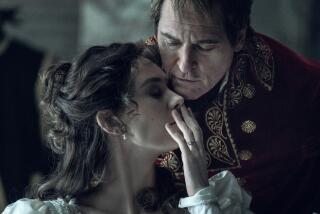France’s Last King
- Share via
What was the special magic Jean Gabin wove that made him perhaps the greatest French film actor of the 20th century? As is true of most film stars, his power was undeniable and undefinable.
The former song-and-dance man held the audience in his spell for 46 years and, nearly three decades after his death, no actor has been able to replace him in the hearts of his countrymen.
French film critic Andre Bazin once described Gabin as “the tragic hero of contemporary cinema.” Sexy and virile, he was both graceful and two-fisted, tough and tender. He excelled at playing the tortured everyman whose life ends tragically, usually because of his love for an unattainable woman: a pessimistic romantic.
“He is simply one of the most incredible French film actors,” says Mohamed Bendjebbour, head of the film and TV department of the French Consulate in Los Angeles. “As my grandmother used to say, she wanted to date him, and her husband, my grandfather, wanted to be him.”
Part of the credit for his success rests with his tailor; no one wore beautiful clothes quite so perfectly as Gabin. In each of his films--especially during his matinee idol years in the 1930s--his clothing reflected each of his character’s personalities and demons.
The natty tailored suits that draped his body like a second skin personified his role as the infamous sexy gangster in “Pepe le Moko.” In “Gueule d’amour,” he turned the heads of women as a French Foreign Legion Casanova in his flowing white trousers. And even the form-fitting suits, ties, sweaters and neck scarfs he wore as a mentally troubled railway man in “La Bete Humaine” reflected the character’s pent-up rage and violent emotions.
Some of Gabin’s greatest roles--and costumes--can be seen beginning tonight at the Los Angeles County Museum of Art’s three-week tribute to the late actor, “Le Grand Gabin.”
The series, which is being presented by LACMA’s film department and the French Consulate’s film and TV department, opens with his seminal performance in “Le Jour se leve,” a searing 1939 melodrama directed by Marcel Carne and penned by Jacques Prevert in which Gabin plays a doomed young factory worker who reflects on how he became a murderer. Also featured on the bill is “Gueule d’amour’ (1936), in which Gabin’s “lady killer” tragically meets his match in the form of mysterious seductress.
“Especially in the ‘30s, he was a really handsome guy, really very masculine, almost macho,” Bendjebbour says. “Director Jean Renoir used to say that the range of feelings Jean Gabin can show and express are limitless. The difference with other actors is that he feels the feelings of the characters.”
Renoir directed Gabin in some of his great performances, notably in “La Bete Humaine” (1938), which screens Sept. 14. One of the film’s indelible moments finds Gabin walking briskly along a railway track after murdering his girlfriend in a mad rage. His face is a blank canvas--one doesn’t know if he is going to commit another murder or kill himself. It’s a powerful scene that’s simple in its execution and beautifully portrayed.
Gabin downplayed his talent. “He used to say that he was born lazy,” Bendjebbour says. “But it was a born talent. He worked a lot on his characters, and so this is why he succeeded in showing so many emotions and feelings. He was great until the end.”
Gabin, he says, was never afraid to say why he picked certain films. “He said that some movies were real, that is to say he loved making them. Others he did to get paid, to pay taxes. But I think every movie he did was of historical value.
Born Jean-Alexis Moncorge in Paris in 1904, Gabin worked as a day laborer before becoming a popular singer and dancer at the Folies Bergere. He was a boulevardier singer very much in the mode of Maurice Chevalier, and CDs of his early recordings are available.
He segued to movies in 1930, and stardom soon followed. “Le Grand Gabin” features several of the films he made in the 1930s, including Renoir’s 1937 antiwar epic “La Grande Illusion” (Saturday), in which he plays a French POW, and the 1938 Carne-Prevert collaboration, “Quai des brumes” (Sept. 13), in which he plays another tragic figure, this time an army deserter who becomes involved with an orphan girl, a criminal kingpin and a suicidal artist.
Gabin visited America briefly in the early ‘40s but made more of a name for himself as Marlene Dietrich’s lover. He made only two films in America, including the 1942 drama “Moontide,” which screens Sept. 14. Although his accent makes him difficult to understand at times, he gives a moving performance as a fisherman who believes he may have accidentally killed a man and who ends up saving a young woman (Ida Lupino) from a suicide attempt.
Gabin returned to Europe to fight the Nazis, then picked up where he left off after the war, playing a more mature version of his ‘30s self. He continued to act until his death in 1976. The LACMA festival highlights Gabin’s post-World War II work, including the 1949 film “La Marie du port” (Sept. 13), which reunited him with Carne and Prevert. He plays a world-weary restaurant owner who travels to his father’s funeral with his mistress and ends up falling for her younger sister.
The series concludes Sept. 21 with a terrific double bill: “Le Plaisir,” Max Ophuls’ 1952 anthology drama in which he plays a simple farmer who encounters a beautiful sophisticate (Danielle Darrieux), and Renoir’s 1955 Technicolor delight “French Cancan,” in which Gabin gives an irrepressible joyous performance as the man who revived the dance form.
Bendjebbour reports that Gabin was a difficult man. “He was very demanding,” he says. “But he was appreciated by everybody who worked with him. Alain Delon, when he talks about working with him, he says it was one of the best experiences ever.”
His funeral played out like a scene from one of his films. After he died of a heart attack, his body was cremated and his ashes were thrown overboard from the military ship Detroyat.
*
“Le Grand Gabin” begins tonight and continues Fridays and Saturdays through Sept. 21. Screenings begin at 7:30 p.m. Admission is $8; $6 for museum and AFI members, people 62 and older and students with valid ID. For information, call (323) 857-6010.
Screening schedule: Tonight: “Le Jour se leve” and “Gueule d’amour”; Saturday: “La Grande Illusion” and “La Traversee de Paris”; Sept. 13: “Quai des brumes” and “La Marie du port”; Sept. 14: “La Bete Humaine” and “Moontide”; Sept. 20: “Pepe le Moko” and “En cas de malheur”; Sept. 21: “Le Plaisir” and “French Cancan”
More to Read
Only good movies
Get the Indie Focus newsletter, Mark Olsen's weekly guide to the world of cinema.
You may occasionally receive promotional content from the Los Angeles Times.











